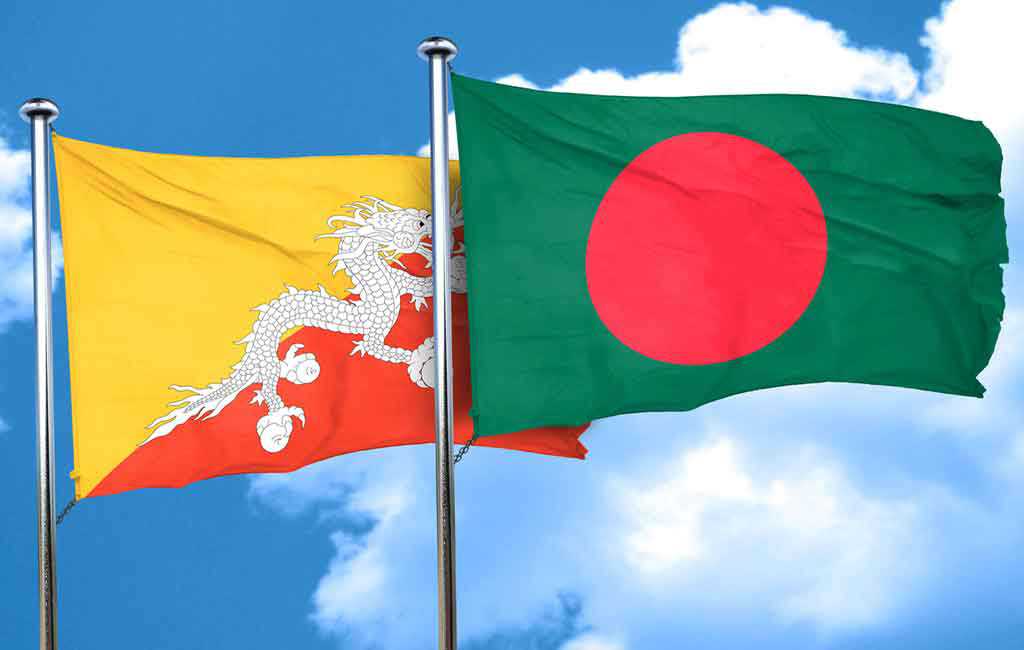Bangladesh signs preferential trade agreement with Bhutan

Image: Collected
It is the first such agreement Bangladesh has signed with any country since independence in 1971Commerce Minister Tipu Munshi and Bhutanese Economic Affairs Minister Lyonpo Loknath Sharma signed the agreement with respect to their respective sides.
Primary Minister Sheikh Hasina and her Bhutanese counterpart Lotay Tshering witnessed the signing ceremony by joining the function virtually from their official residences found in Dhaka and Thimphu respectively.
The PTA with Bhutan is the first such bilateral preferential trade agreement Bangladesh signed with any country since its independence in 1971.
The signing was held on Sunday (December 6) to make the day memorable as upon this day in 1971, Bhutan became the first country on the planet to recognize Bangladesh’s independence.
Besides, the 50th anniversary of diplomatic relations between Bangladesh and Bhutan may also be celebrated on this day.
Some 100 Bangladeshi products will get duty-free usage of Bhutan. Included in these are baby clothes and attire gadgets, men's trousers and shorts, jackets and blazers, jute and jute goods, leather and leather goods, dried out cell battery, fan, view, potato, condensed milk, cement, toothbrush, plywood, particle panel, mineral and carbonated normal water, green tea extract, orange juice, pineapple juice, and guava juice.
Meanwhile, 34 Bhutanese goods that may get duty-free access to the Bangladeshi marketplace include orange, apple, ginger, fruit juice, milk, normal honey, wheat or perhaps meslin flour, homogenized preparations of jams, fruit jellies, marmalades, foodstuff preparations of soybeans, mineral water, wheat bran, quartzite, cement clinker, limestone, wooden particle boards, and wooden furniture.
Both countries can increase the number of items slowly but surely through consultation.
The bilateral trade level of both countries was just $12.77 million in the fiscal year 2008-09 with Bangladesh’s exports to Bhutan amounting to $0.61 million although it imported goods worth $12.16 million.
The bilateral trade volume reached $49.65 million in the fiscal year 2018-19 out which Bangladesh’s exports to Bhutan totalled $7.56 million against the imports of $42.09 million.
Focus on PTA, FTA
As Bangladesh looks forward to graduating out of the least developed nation (LDC) status in 2024, it really is increasingly emphasizing bilateral preferential trade arrangement (PTA) and free trade arrangement (FTA) to improve its export earnings within the next three to 6 years.
While an FTA stipulates free trade between countries, a PTA is a lot less broad covering preferential tariffs for a couple of products or services.
Bangladesh, which got the position of lower middle-income country in 2015, currently advantages from preferential tariffs for its export of things to some countries, but it might lose access to such lower trade terms once it graduates from the LDC list by 2024, according to World Trade Firm (WTO) norms.
According to sources by the Commerce Ministry, even following getting a middle-profits country position in 2024, Bangladesh will get three even more years while "grace period" to take advantage all trade facilities appreciated by an LDC country. Thus, by 2027, Dhaka is normally aiming to raise its coffers through export income riding on LDC position.
Bangladesh has recently started taking initiatives in this regard. Based on the Commerce Ministry, the federal government is normally reviewing its several trade agreements with 44 countries to learn the possibilities of signing PTAs with them.
Up to now, Dhaka has approached 11 countries for inking FTAs with them. The responses from these countries have already been positive, the resources said. Besides, significant improvement has been manufactured in signing PTAs with Nepal and Indonesia, and there may be signing of PTAs with Nepal and Indonesia by June next, in line with the sources.
Bangladesh about Sunday signed it has the maiden preferential trade agreement (PTA) with Bhutan to boost bilateral trade between your two countries.
Source: https://www.dhakatribune.com
Tags :
Previous Story
- Exporters pin big hopes on Bhutan
- Bangladesh, Uzbekistan to form JWG for trade, investment
- Commerce minister fears export fall due to coronavirus...
- Bangladesh’s growth necessitates trade diversification: Minister
- New Indian envoy: Bangladesh remarkably changed since my...
- Policy for automobile sector on cards
- Bangladesh clashes prompt garment industry wage review